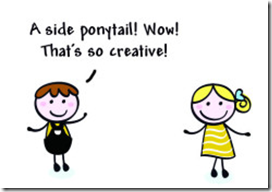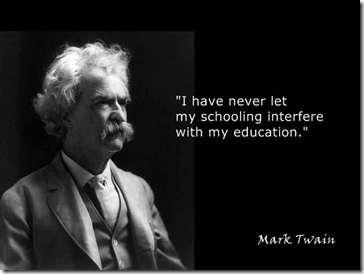As an elementary school teacher, I have made it my policy for more than a decade to avoid commenting on a student’s physical appearance. A student’s appearance should be the last thing of concern to a teacher, but more importantly, these comments, even when positive, can be damaging and hurtful to kids.

This policy has been scoffed at by many of my friends and colleagues. I have been laughed at and criticized for my position. Told that I am taking things too far. Becoming too politically correct.
Yet I have articulated this position to every class of students over the past ten years, and I have never had a single student scoff or laugh or even question my policy. Every single student has appreciated and supported my position. Some of have tried to adopt it as well.
It’s only adults who think I’m dumb.
Up until this point, I haven’t cared. I know I’m right. I know I’m doing right by my students. I’m accustomed to suffering fools gladly.
Then I watched Meaghan Ramsey’s TED Talk “Why thinking you’re ugly is bad for you.”
It turns out that Ramsey would agree with me. She would support my position. Endorse it, even.
In her own words:
“Why can’t we compliment people based upon their effort and actions and not their appearance?”
After listening to Meaghan Ramsey’s talk and learning more about the incredible struggles that young people face when it comes to physical appearance and body image, I decided that it’s no longer good enough to simply ignore my detractors. I need to change their minds. Convince them otherwise. Make them see the light.
I want my policy of refraining from commenting on a student’s physical appearance to become a policy that all teachers adopt. I want this to be a policy that educators embrace and champion.
If you are a teacher, I ask you to consider adopting this policy for yourself. Watch Ramsey’s TED Talk. Read my original post on the issue, which outlines my rationale. Ask yourself if there is any reason in the world to compliment the pretty dress or the new haircut in your classroom today. Of all the finite minutes that we have to spend with our students, do you want to use even a tiny fraction of that time talking about wardrobe choices and hairstyles?
Is that the culture you want in your classroom?
If you agree with me, I ask you to do more than simply adopt the policy yourself. I ask that you become a champion for this policy as well.
- Talk to your colleagues.
- Forward them this blog post.
- Share this blog post via your social media channels.
- Pass along Meaghan Ramsey’s TED Talk.
- Find like minded people who will support you, and when they cannot be found, convince them to be like minded.
Even better, talk to your students. They are likely to be more supportive of this policy than many of the adults with whom you work. Enlist the support of the kids. Turn them into the spokespeople for this issue.
If students rise up and demand that teachers stop commenting on their physical appearance, both positive or otherwise, things would change overnight.
I plan on doing my part as well. I have already reached out to several TED conferences, asking if I can speak on this issue. If you know of someone hosting a conference let me know.
Whenever I am standing in front of a group of teachers (which happens more often than you would think), I will speak about my policy, tangentially if necessary, and ask them to adopt it for themselves.
I’ll look for outlets with larger audiences who will publish my thoughts on this issue. Magazines. Journals. Online resources.
I will seek to change minds and convince teachers that this is the right thing to do.
And it’s not easy. When I first adopted this policy for myself, it took months to train myself to refrain from commenting on physical appearance, and I was never one to mention physical appearance to begin with. I had to reframe my thinking and construct strategies to avoid situations where complimenting a student’s physical appearance almost seemed necessary.
When a student walks into my classroom and asks if I like her new haircut, I had to learn to say, “I didn’t notice your hair at all, but I loved the way you didn’t give up when we were solving those problems in math yesterday. Persistence is going to get you far in life.”
That’s a hard transition to make. It feels incredibly awkward at first. It’s still a little awkward. Explaining my rationale to my students helped, but it was still a long road to where I am today.
Get on the road now. Don’t delay. And spread the word.
It’s the right thing to do. Don’t let anyone else tell you otherwise.



